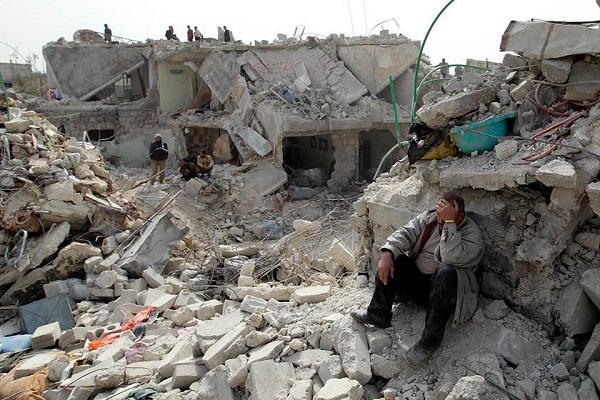Alwaght- The Syrian conflict is the world's most costly war in the recent decades mainly because multiple regional and international actors played roles in it. Last week, Syria’s Deputy Foreign Minister Faisal Mekdad said that the Arab countries had disbursed $137 billion to finance illegal armed groups fighting in his country.
The Syrian deputy foreign minister declined to specify by name the countries that support terorists, but Saudi Arabia, the United Arab Emirates, and Qatar were definitely the wealthy Arab countries that funded the war on Damascus.
The Syrian government frequently accused these three parties of bankrolling the armed takfiris on the Syrian soil. But it is not the only verbal accusations that point the figures at the Arab monarchies. There are concrete documents exposing their involvement in a pro-militants campaign of support against the Syrian government.
In 2014, a senior Saudi diplomat revealed to the BBC that the oil-wealthy kingdom intended to deliver modern anti-tank weapons to the Syrian anti-Assad militants, known as Free Syrian Army (FSA), to strengthen them in the face of the Syrian leader and his allies.
Also in July this year, the British newspaper The Independent broke the news about the Saudi weapons purchasing from a Bosnian company and sending them to the takfiris in Syria. In an article, the British daily published documents showing how the Saudis bought arms from Bosnia, Serbia, Bulgaria, and the US and supplied them to the Al-Qaeda terrorist group’s Syrian offshoots, as well as ISIS.
The article was a field investigation by Robert Fisk, The Independent’s reporter who found log book belonging to the arms in the basement of a bombed-out al-Qaeda arms storage building in eastern Aleppo last year.
Although not all of the military and logistical support to the anti-Syrian armed groups are provided by Saudi Arabia, the Arab kingdom is the main supporter of terrorist in Syria. In many reports of military help to the terrorists in Syria, Riyadh’s name is constantly given as a top pro-terror spender.
While the Saudi rulers heavily spend on the armed factions, at home they face a huge budget deficit and the ordinary Saudis and also businesses are coping with unprecedented austerity measures.
In December 2015, the fourth year of the Syrian war, the Saudi ministry of finance released a report warning that the national economy’s budget deficit hit the $98 billion. In response to the crisis, the government raised the gas prices by 50 percent and introduced subsidy cuts to the economy. At the time, it released a statement saying that the government expenses were 975 billion Saudi riyals ($250 billion), meaning 40 percent more than expected. Although the main cause is linked to the constant expenses of the Yemen war, the Syrian war has certainly a share in this increase.
Similar predicament happened to the Saudi budget in late 2017. An official at the Saudi ministry of finance said that the budget deficit in the year reached 8.9 percent of the country’s gross domestic production (GDP).
Despite financial troubles the kingdom has been grappling with over the past few years, no signs showing Riyadh reduced its funding to special goals in Syria appeared. The Syrian army is defeating the terrorist groups one after another and so far, it has reclaimed a majority of the former terrorist-controlled areas. But the Saudi rulers keep injecting money into their Syrian strategy under new forms. On Saturday, for example, Saudi Arabia announced a $100 million funding to the US to keep the Syrian forces on the Syrian soil.
The UAE, though facing smaller economic woes than Saudi Arabia, over the past few years took impacts from the global economic crisis. The small Persian Gulf state resorted to austerity measures in response. Earlier this year, the country approved the value-added tax. Despite objection from local leaders, the law was also enforced in Dubai, the emirate prominent for its tax-free business milieu. The economic concerns, mainly grown over the falling oil incomes and the heavy costs of the war in Yemen and intervention in the regional and African states, caused divisions among the federal government’s parts. Five out of the seven UAE emirates are suffering from poor economic conditions and are dependent on the political capital Abu Dhabi and Dubai the economic capital as they lack appropriate geographical positions or oil and gas reserves.
Beside devastation of Syria, another outcome of the Saudi and Emirati military supports for the terrorists in Syria is the profits flowing to the Western arms producers. Over seven years of fighting brought nothing but displacement, massacre, and destruction for the Syrians, but it proved lucrative to the weapons makers, which are majorly American and immensely cashed in on the petrodollar-powered Saudi and UAE interventionist policy in Syria.



























